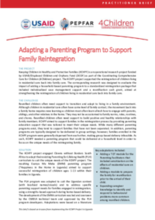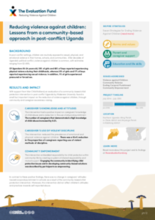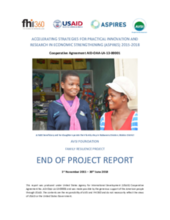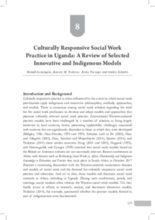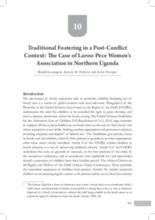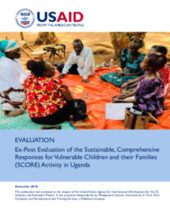This country page features an interactive, icon-based data dashboard providing a national-level overview of the status of children’s care and care reform efforts (a “Country Care Snapshot”), along with a list of resources and organizations in the country.
demographic_data
childrens_living_arrangement
children_living_without_bio
social_work_force
key_stakeholders
Key Stakeholders
Add New DataOther Relevant Reforms
Add New Datadrivers_of_institutionalisation
Drivers of Institutionaliziation
Add New Datakey_research_and_information
Key Data Sources
Add New DataThe Children Act (Uganda)
Country Care Review: Uganda
Prevalence and number of children living in institutional care: global, regional, and country estimates
The National Integrated Early Childhood Development Policy Action Plan (2016-2021) of Uganda
Catholic Care for Children in Uganda: A Family for Every Child - Findings from a Midterm Evaluation
Acknowledgements
Data for this country care snapshot was contributed by a consultant with the Data for Impact (D4I) Project at Palladium Group LLC.
Displaying 151 - 160 of 418
This Practitioner Brief presents key learning and recommendations from the Keeping Children in Healthy and Protective Families (KCHPF) project, an operational research project which supported the reintegration of children living in residential care back into family care in Uganda.
This program brief provides an overview of, and key findings from, an evaluation of a community-based child protection intervention in post-conflict Uganda by Makerere University.
This report describes the FARE project - a subproject of ASPIRES that sought to develop evidence and programming guidance for matching contextually appropriate economic interventions with specifically targeted households to reintegrate separated children into families and prevent unnecessary separation of children from their families - and summarizes achievements, challenges, and learning.
This chapter from Social Work Practice in Africa: Indigenous and Innovative Approaches showcases examples of home-grown indigenous and innovative models of social work practice in Uganda, including local models for addressing the HIV/AIDS orphan crisis in Rakai district.
This chapter from Social Work Practice in Africa: Indigenous and Innovative Approaches presents a traditional fostering model adopted by a group of women in Northern Uganda, analysing its potential for building resilience and for contributing to social capital and social development within the broad context of post-conflict situations.
This study sought to examine social protection mechanisms for children living on the streets of Uganda, a case study of Kampala.
This ex-post evaluation examines the sustainability of outcomes from USAID’s Sustainable, Comprehensive Responses for Vulnerable Children and their Families (SCORE) activity.
"A boom in the orphanage industry is fuelling concern that many institutions are run for economic benefit, with scant regulation, and are damaging children," says this article from the Guardian.
This video presents the work of the FARE family strengthening program in Uganda to prevent separation of families and reintegrate children who are separated from their families, including the story of one young person and his family who were impacted by the program.
In this video, Kate van Doore, International Child Rights Lawyer of Griffith University Law School, discusses her experience with opening up an orphanage in Nepal, and another in Uganda, and then discovering that the children in these homes had living parents and families and that the orphanages had been made into money-making enterprises.

